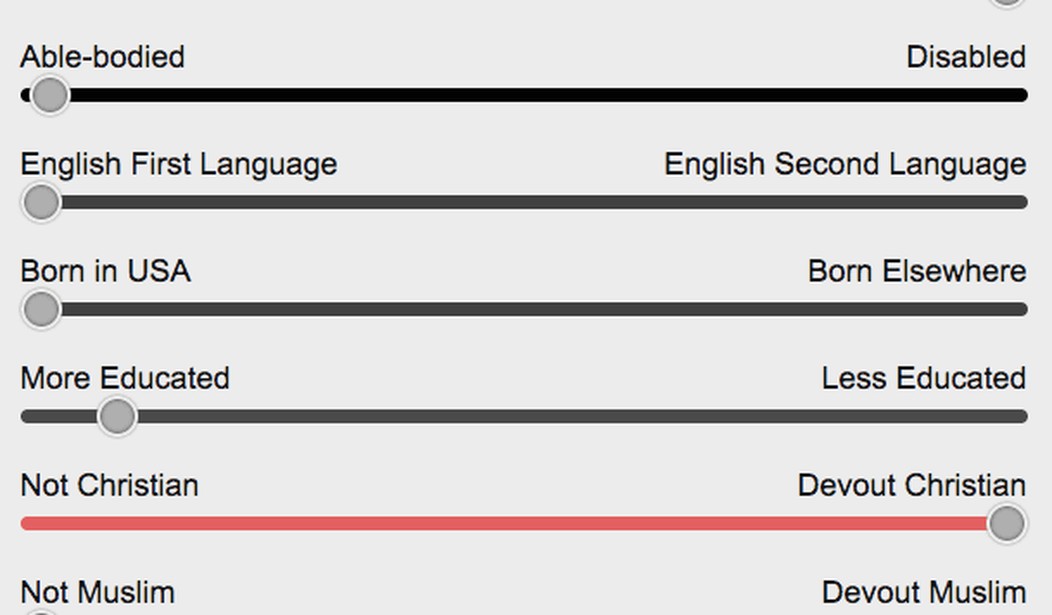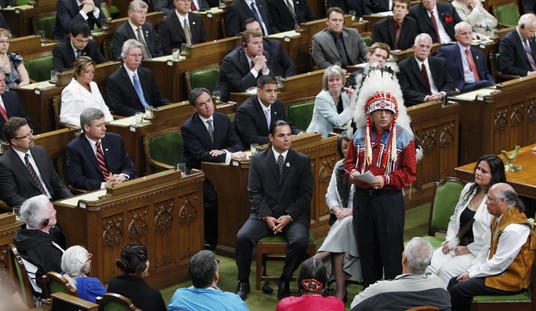By now I’m sure most of our readers have been confronted by the idea of intersectionality — the leftist view that there is a hierarchy of victimhood in the world. Individuals who fit into various minority categories are found to be more credible than those who, by nature of birth, are in the majority — and bonus points are awarded if you fit into more than one category.
Perhaps you’ve been wondering how you rate on the grievance scale and how much your “privilege” affects your ability to further the cause of progressivism interact with people who are not like you. I have good news for you: Help has arrived in the form of a handy-dandy calculator from IntersectionalityScore.com.
According to the website, intersectionality is the “theory that the overlap of various social identities, such as race, gender, and sexuality, contributes to the systemic oppression and discrimination experienced by an individual.” The calculator is used to identify factors that contribute to your intersectionality so that you can use the information “when you’re dealing with others to know who’s more marginalized.” Having a high intersectionality score, the website explains, “means being faced with more challenges to get ahead than someone who has a lower score.”
Unfortunately, the site does not provide contact information (it was sent to me by an anonymous PJM reader), so I was not able to determine who’s behind this quiz or ascertain any details about their methodology. The domain was registered at GoDaddy.com on November 26 by an unnamed user or group out of Scottsdale, Arizona. It’s quite possible that this is a parody site — the descriptions are so over that top that it’s hard to imagine it being real. But then again, the whole idea of intersectionality is utter nonsense, so it’s not a stretch to think that people really do put stock in these utterly nonsensical numbers.
I was curious enough to take the calculator out for a spin, even though I knew I probably wouldn’t fare well on the quiz. It didn’t disappoint. My intersectionality score was 20, which means that 54 percent of others are more privileged than me:

(Image via IntersectionalityScore.com)
The site explains that the sliders are useful because “people fit along a spectrum of identities.” For example, they say, “you might be slightly bisexual, somewhat poor, Jewish but rarely wear a yarmulke, and native born but travel frequently abroad. By having the option to be ‘somewhere in the middle,’ this gives a more accurate assessment of your intersectionality score.”
Being female appears to have given me a bit of a boost in my score, although I think I lost points for my hardcore cisgender-y ways. There was also a 9-point penalty for identifying as a devout Christian.
My 27-year-old son did not fare as well, coming in with a paltry five points.

(Image via IntersectionalityScore.com)
Being male, straight and a devout Christian, he really didn’t have a chance. Here’s how they prioritize various innate characteristics and life choices on the grievance scale:

(Image via IntersectionalityScore.com)
The groups most likely to be oppressors, according to the scale, are straight, white, native-born, English-speaking males. A full 80 percent of the 73,500 respondents scored 30 points or fewer on the quiz.
India, by far, had the highest intersectional scores, which, according to the website, means they have the “highest levels of marginalized people.” The U.S. was near the bottom of the pack, coming in with lower intersectional scores than Norway and Canada and slightly higher than the Netherlands and Sweden.
It’s important to note some important items that are not taken into account in this quiz (and within the larger intersectionality scheme). For example, if you grew up in poverty but managed to avail yourself of a decent education and achieve moderate success in life, you’re not given “credit” for your past deficits — especially if you’re a white male. And if you were raised an atheist and converted to Christianity as an adult, you’re dinged for that decision. The quiz ignores the sources of real oppression in the world — radical Islam and rampant anti-Semitism are just two examples — and instead focuses on fashionable left-wing ideologies that should be filed under “First World problems.” On the intersectionality scale, Muslims throwing gays off buildings is not nearly as bad as a mean tweet opposing the transgender ideology and the eradication of Christianity in certain parts of the world doesn’t compare to the hostility upper-class American women allegedly face in the workplace.
The quiz offers little hope for those who have a low intersectional score. “Unfortunately, you are born with most of your intersectional factors,” the site claims. “However, you can make some improvement to your score by getting more involved with Islam or Judaism, donate all excess wealth to charity, or explore the wild side of your sexuality. The easiest way to improve your score, however, is to champion the intersectionality of your more-marginalized friends. You may award yourself up to 5 points depending on the level of your activism.”
In other words, time to step-up your virtue-signaling Twitter game and try to fit in some debauched sexuality on the side if you have time.
But don’t think for a minute that a high intersectionality score means you’re immunized from being called an oppressor. “You may be vulnerable to ‘weakest link’ attacks – that is, being called an oppressor on any of the intersectionality factors by those disadvantaged in that factor,” they explain. “For example, a gay black man could still be accused of being a misogynist by women or a poor, immigrant woman could be called transphobic by a transperson.”
Translation: the only way to win this game is by being a black, female, disabled, non-native transgender Muslim who is poorly educated. Everyone one else is an oppressor on some level. Even if you don’t believe yourself to be an oppressor, you are one because of your privilege — in fact, your privilege makes impossible to see how badly you’re oppressing others!
See how the game is played?
How did you score? Let me know in the comments.
Follow me on Twitter @pbolyard.










Join the conversation as a VIP Member